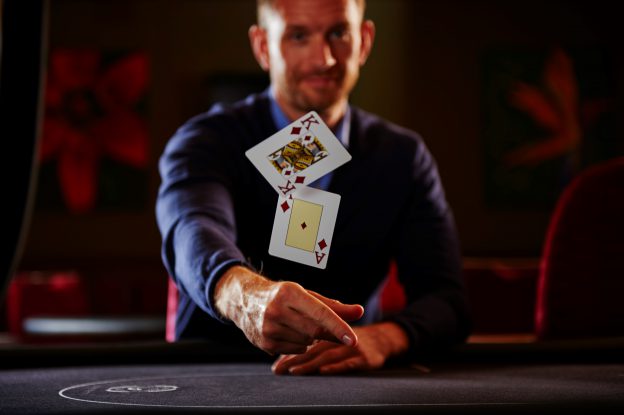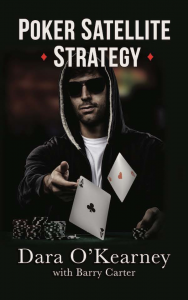Package Value
Sadly not many operators offer satellite packages to Vegas anymore so the Grosvenor Poker Road to Vegas packages are not to be missed out on. The £3,000 packages include a $500 buy-in to The Big 50 event at the WSOP, seven nights in the Linq Hotel, flights and spending money. Not to mention hospitality and the chance to hang around with the Pros from Team Grosvenor. All information is available here. These tournaments have been regularly overlaying 20-30% so get involved this weekend if you like added value.
Satellites are a misunderstood format and a lot more complex than some people give them credit for. So much so that I have cowritten a book called Poker Satellite Strategy with legendary satellite grinder Dara O’Kearney. To highlight just how nuanced satellites can be, I’m going to look at how you should adjust specifically in these Road to Vegas tournaments compared to other satellites.
Assess the field
The first to do is make an assessment of the field. Most of the monetary value of the Road to Vegas package goes to the holiday aspect of the trip rather than the tournament buy-in. This is a good thing because it’s really about the Vegas trip first and foremost, but that is unusual for a satellite package. For that reason, you can safely assume the field is going to be quite soft. More on how that’s relevant in a moment.
It’s £110 to enter and you get 3,000 chips. There is an optional add-on of 5,000 chips and you can also rebuy once for 3,000 chips. If you have the budget for it, you should usually take the add-on, especially because most people won’t. It should instantly bump you up the stack rankings at the end of the rebuy period because typically most casual players try and buy in just the one time.
You can late register up to 120 minutes in at level 12, which is the 150/300 level. When you register is one of the key decisions you will make in this satellite. It is always profitable to late register a satellite. If you have a good understanding of ICM, all you have to do is play around with an ICM calculator to see it gives you an immediate equity boost, but if that is not your thing yet just from a common sense perspective the name of the game in satellites is not to win, it is just to outlast a certain number of players. When you register late in the Road to Vegas satellite you have already outlasted the players who were eliminated and didn’t rebuy.
If you are going to late register, you have to be comfortable with short stack play and variance. You’ll be coming in at 10 big blinds and having to shove quite early on to give yourself a chance at surviving. However, as this tournament is likely softer and a ‘bucket list’ satellite for some players, it might still be better for you to register when the satellite starts to take advantage of the weaker players. Make a value judgement based on the merits of your own deep stack and short stack game.
Most people know they have to play tight near the bubble of a satellite, but when should you start to slow down? You can work this out by estimating what the Average Cash Stack will be on the bubble. Normally you can just multiply your starting stack by the number of players are required to make a seat to work this out, however the add-on system in Road to Vegas complicates this because the starting stack is 3,000 and the add-on is 5,000. So perhaps a safer rule of thumb here is to play your normal game (but a bit tighter) until the late reg period is over, then look at the total number of chips in play and divide that by the number of seats on offer. So for example if there are 900,000 chips in play and three seats on offer, the Average Cash Stack will be 300,000.
Once you get close to the Average Cash Stack, perhaps 70% of it (so 210,000 in this example), this is typically when you should play much tighter and preserve your stack rather than trying to accumulate more chips. In satellites the prizes are of equal value, there are no advantages to ending with the biggest stack. The upside of winning more chips late on is dwarfed by the downside of busting out. We go into much more depth about when to be aggressive and when to make big folds in Poker Satellite Strategy, but prior to reading that this is a reliable heuristic to follow.
Spot the mark
Finally, as this is a ‘bucket list’ event for some players you can safely assume that plenty of the people at the final table will be trying desperately to make the payouts without taking any risks. A good way of spotting these players are they are the ones who will stall every hand (which in itself is a perfectly reasonable thing to do in a satellite). When you get to the final table pay particular attention to the players who look like they are clinging on to dear life, in the absence of other reads these are the players you should be targeting when you try to steal some blinds to stay afloat yourself. Likewise, stay out of the way of the ones who seemingly have a seat locked up but are still playing like a bigger prize goes to the player who ends the tournament with the most chips.
Should you miss out on the last 3 packages satellite being held this Sunday 28th April, there is another route you can take. Top the GCOOP IV (a £100k GTD friendly tournament series only on grosvenorpoker.com from 28th April – 5th May) Leaderboard and you will join #TeamGrosvenor, as there is £5,000 in added value. A full Vegas package is the top prize.
Barry Carter is the co-author of Poker Satellite Strategy which is available now at all good online book stores.


Leave a Reply